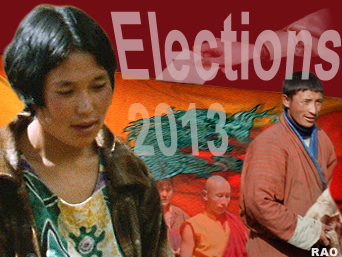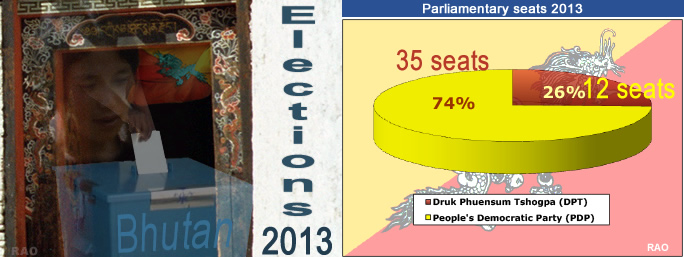| You are here: | RAO Home > Travel > Bhutan > Topics > Politics > Elections 2013 > Results | Search |
 |
| Bhutan - Politics |
| Elections 2008 |
|
 |
| Elections 2013 -The new ruling party |
The general election saw a dramatic turnaround of primary trends
 |
|
Rightly so, in a closely contested race in most of the 47 constituencies, PDP went on to claim 32 seats in the National Assembly, leaving 15 seats for Druk Phuensum Tshogpa (DPT) the former ruling party, to become the opposition.
The PDP also claims its victory, after emerging from near obscurity, having been left with just two members to serve in the opposition after first parliamentary elections.
 |
This was also the party, many had wondered before the primaries, whether it would make it to the general elections, with Druk Nyamrup Tshogpa coming on strong.
But it went on to win 12 constituencies then, and secured second highest number of votes after DPT that won in 33 constituencies.The vote difference between the two then was more than 25,000.
However, yesterday, PDP returned with a bang, sweeping almost all the constituencies in the south, and even breaking into DPT strongholds in the east.
Local observers following elections credited the president of the winning party, Tshering Tobgay, for it.
He had done a good job during his stint as the opposition leader, created impressions through communications and interactions with people in person as well as via social sites.
His winning quality, perhaps, was the "approachable" person in him, the so-called "achu Tshering" tag, as opposed to how many viewed DPT’s senior members, including the former prime minister.
The party never failed to project itself as commoner’s party, keeping its influential supporters out of the scene.Even their pledges were "tangible" ones people could easily relate to – a power tiller for each chiwog, banks in gewogs, more monetary authority for the local government, housing allowance for civil servants, among others.
Bringing in some of the candidates from DNT after the primary round also added to PDP’s strength.Of the seven candidates they took in, former DNT candidates gave the party five seats.
Wins in the east could also be attributed to its party president, Tshering Tobgay, courageously promising ministerial berth to candidates in Lhuentse and Trashigang towards the latter part of campaign.
The fact is PDP’s win for the party comes despite an ill coordinated campaign as compared to DPT.Some of the candidates in the field had no knowledge of the party manifesto content when questioned by people.
But PDP had always picked on dwindling economy, rupee shortage, and unemployment scenario that dented DPT’s image.
They were projected as incompetent, unable to handle situation, which led to swaying of voters from certain sections, particularly business and youth.
It was further magnified when focus during the campaign shifted to Bhutan-India relations, which was said to have been "strained" because of DPT president ‘cosying up’ to China.
India’s removal of subsidy on cooking gas and kerosene put a stamp on it.People started believing what they earlier suspected was mere politicising of issues.
The timing, India said, was "coincidental" but it worked well in favour of PDP.
On the other hand, despite venturing on a coordinated campaign, DPT was plagued with allegations right from the start, with a lot of negative publicity on mainstream as well as social media.
There were also voters clearly voicing their dissatisfaction on performance of some of the candidates who represented them.
But whatever the reason, Bhutanese people exercised their democratic rights by opting for change.
As one woman voter in Wangdue clearly said, "We gave DPT a chance, now we feel we should give it to PDP."
Such is the power of the people.
| Contributed by Kesang Dema, Kuensel, Bhutan's National Newspaper, July 2013 |
| Links |
| External Links |
|
|
|
 |
|
|